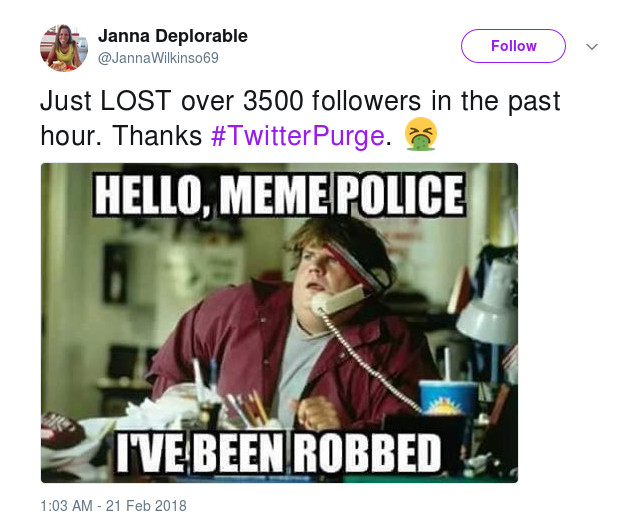Did the US ‘hack back’ at Russia? Here’s why this matters in cyberwarfare.
|
|
Full coverage |

A number of “alt-right,” pro-Trump, and self-described conservative social media personalities awoke this morning to find that they had a lot fewer followers on Twitter than they had the night before. The apparent cause was the latest culling by Twitter of accounts that in some way violated the company’s terms of service, a Twitter spokesperson told Ars, including “behaviors that indicate automated activity or violations of our policies around having multiple accounts, or abuse.” The sweep has some on the right accusing Twitter of politically motivated censorship.
“Twitter’s tools are apolitical, and we enforce our rules without political bias,” a Twitter spokesperson said in a statement emailed to Ars. The accounts were targeted as part of “our ongoing work in safety,” the spokesperson said. “We also take action on any accounts we find that violate our terms of service, including asking account owners to confirm a phone number so we can confirm a human is behind it. That’s why some people may be experiencing suspensions or locks. This is part of our ongoing, comprehensive efforts to make Twitter safer and healthier for everyone.”
In response to the sudden culling of accounts, starting at around 1am Eastern Time today, some aligned with “alt-right” figures such as white supremacist Richard Spencer started the #TwitterLockOut and #TwitterPurge hashtags, and some resurfaced Project Veritas’ accusations that Twitter employees were deliberately censoring “right-leaning” accounts. Spencer himself claimed to have lost over 1,000 followers over a few hours overnight; Janna “Deplorable” Wilkinson, who had her own account suspended in October, claimed to have lost 3,500 followers.
Read 1 remaining paragraphs | Comments
Techdirt has been following the ridiculous proposal to extend EU copyright even further to include tiny snippets from articles for years now. The idea has already been tried twice in the European Union, and failed dismally on both occasions. In Spain, a study showed the move there caused serious economic damage, especially to smaller companies; German publishers tacitly admitted the law was pointless when they granted Google a free license to use snippets from their titles. More recently, the European Commission’s own research confirmed that far from harming publishers, news aggregators have a positive impact on the industry’s advertising revenue. Despite the clear indications that a snippet tax is a terrible idea, some want to go even further, and make it apply to hyperlinks too. Writing in the French newspaper Le Monde back in December, large news agencies including Germany’s DPA and France’s AFP complained that sites:
offer internet users the work done by others, the news media, by freely publishing hypertext links to their stories. […] Solutions must be found. […] We strongly urge our governments, the European parliament and the commission to proceed with this directive.
Now EU publishers have weighed in on the snippet tax, formally known as Article 11 of the proposed Copyright Directive. Their latest position paper, embedded below, makes a confession:
We acknowledge that concerns have been raised that Article 11 as proposed by the Commission may have a negative effect on the legitimate personal non-commercial use of excerpts from press publications by a natural person by way of hyperlinking or sharing.
But there’s no reason to worry, they say, for the following reason:
However, we would like to emphasize that it is in publishers’ interest to make their products available as widely as possible, on as many platforms as possible and this is why publishers themselves encourage their readers to share articles and news on social media for free.
In other words: trust us, we won’t misuse a new right to forbid anyone from sharing even tiny snippets. Except, of course, copyright holders have repeatedly abused their intellectual monopoly to censor material, in precisely this way. EU publishers want this new right to block snippets to apply even to single words:
We therefore question the necessity of introducing in the new [EU] Presidency’s compromise text, a reduction of the scope of protection granted to press publishers to acts of reproduction and making available to the public performed by “service providers” and excluding “individual words or very short extracts of text”.
They also want to extend the scope of the snippet ban:
In our view it is essential that any commercial entity or organisation, regardless of their business model, including those currently licensed by press publishers, exclusively or collectively, continues to be within scope of protection. Typically these organisations can be aggregators, media monitoring and press clipping agencies, individual companies, or public institutions.
This isn’t just about making search engines pay for the privilege of using snippets of text: it would include every company, of whatever size, and every public body, however meritorious or altruistic its activities, that uses them. The new position paper is important because it makes clearer than ever before that the snippet tax is not about stopping a few big players like Google from indexing stories from publications. After all, that could be easily achieved by blocking the crawlers using the robot.txt file. Article 11 is about something much bigger. It is the latest expression of the publishing industry’s apparently infinite sense of entitlement — that it has a right to control even “individual words or very short extracts of text” used by “any commercial entity or organisation, regardless of their business model”, as the document puts it. The egotism of publishers is so monstrous that they don’t even care if achieving this insane level of control over the Internet goes against their own economic interests, as the evidence shows it will. Power, it seems, is more important than profits.
Follow me @glynmoody on Twitter or identi.ca, and +glynmoody on Google+
Permalink | Comments | Email This Story
Techdirt.